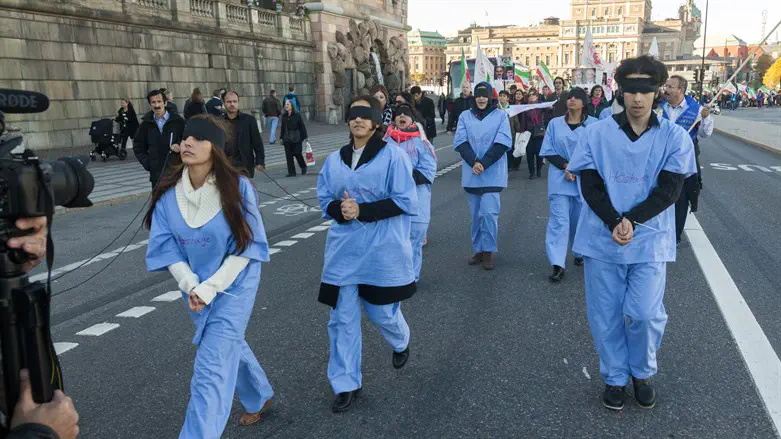
Iran's rulers are alarmed at the prospect of nationwide mass protests and unrest as the hot summer months approach. Prices of some basic goods like bread, dairy products and chicken skyrocketed as much as 300 percent overnight. Already there have been nightly protests against the price rises and mismanagement of the economy in the oil rich province of Khuzestan. Protests are spreading to neighboring provinces.

Radio Free Liberty image.
Last week, a leaked audio file from a senior Iran state TV executive demonstrated the depth of the regime's concern. "The country is going through an exceptional situation, the soaring prices, frustration with the officials and so on," Alireza Habibi tells producers and presenters. "... But we should try to calm the public's anxieties, not incite it further .... Don't go and make programs highlighting these problems. This is not the time for making such programs. Wait till things calm down."
To make sure his instructions are understood clearly, Habibi added "the slightest dissent in this regard will be unforgivable, because this is a national security issue. So make sure you yourself and your channel don't suffer as a result of your actions."
These concerns were also echoed last Tuesday by Khuzestan MP Qassem Sa'edi. "People are struggling to make ends meet," he said. They want to be loyal to the regime, but there is a limit to how much they can take. There is a good likelihood we face a bigger danger than the previous nationwide unrests."
Sensing the brewing tension and fears that large gatherings will trigger mass protests, Khuzestan's Security Maintenance Council – a body that assesses current trends and takes preemptive actions to avert social unrest – announced the football match between Khuzestan Steel FC and Tehran's Independence FC would be held without spectators.
Despite all the efforts to maintain order, protests erupted last Wednesday night in several cities in Khuzestan province, which is in southwestern Iran. In Ahvaz, protesters called for Iranian President Ebrahim Raisi to resign: "Raisi, you liar," they chanted. "What happened to all those things you promised?"
In Dezful, people chanted, "We don't want an Islamic Republic," and "We will fight, we will die, we will take back our Iran." In Andimeshk, they chanted "Mullahs Get Lost!" In Izeh, the security forces fired tear gas as people chanted "Death to Khamenei" and fought back.
Last Thursday, the protests spread to Khuzestan's neighboring province, Lorestan. In Dorood, people fought the anti-riot special units. In Share-Kord, people pleaded for law enforcement forces to join them, saying they, too, are the victims of this regime's mismanagement.
In one of the videos released on social media, people encircled a Baseej militia member after he arrested a protester. "Can you not see how the people are suffering?" they asked. In another video, a man in his car asks the special units moving towards the protesters with their shields and batons, "Do you not have to buy rice and oil yourselves?"
The regime's response was the usual shutting down of the internet to stop people from seeing the protest videos, which urged others to join the protesters too.
Law enforcement forces have tried to contain the situation and use selective punishment rather than apply a brutal crackdown, as they have on previous occasions.
Despite the regime's fears and concerns about the likelihood of unrest, this week's protests still took them by surprise. They thought such unrest wouldn't start until summer, when the electricity and water shortages, and rising prices synergized into a major discontent.
Meanwhile Iran's teachers are organizing nationwide protests against their deteriorating living standards as their wages fall behind the soaring inflation. The regime has arrested several teachers' union activists to stop the protests but the gatherings have continued. In a desperate attempt to discredit them, the security apparatus has tried to accuse the teachers of being manipulated by foreign agents.
Last Wednesday, Cécile Kohler, a French teaching union official, and her husband were arrested as they prepared to leave Tehran after visiting Iran. Iranian authorities accused them of "attempting to create political chaos" by meeting with the Iranian Teachers Trade Association during their visit.
Until now, Iran, sensing an over-eagerness among European countries and the United States to reinstate the nuclear agreement, has sought more concessions and taken more foreign hostages to strengthen its negotiating hand. If the expected nationwide unrest becomes a serious threat to the regime, however, it may be forced into accepting a nuclear deal with fewer concessions in order to get some urgent economic relief and ease domestic tension.
If that happens, it remains to be seen if the Biden administration will send Iran another lifeline to overcome its summer of discontent, similar to when President Obama sent a plane with cash that had been frozen after Iran accepted the original nuclear deal and released four American prisoners.
 IPT Senior Fellow Potkin Azarmehr is a London-based investigative journalist, business intelligence analyst, and TV documentary maker who was born in Iran. He regularly contributes to several newspapers and television stations on Iran and Middle East related news. You can follow him on twitter@potkazar
IPT Senior Fellow Potkin Azarmehr is a London-based investigative journalist, business intelligence analyst, and TV documentary maker who was born in Iran. He regularly contributes to several newspapers and television stations on Iran and Middle East related news. You can follow him on twitter@potkazar
 Steven Emerson is executive director of theInvestigative Project on Terrorism, the author of eight books on national security and terrorism, the producer of two documentaries, and the author of hundreds of articles in national and international publications.
Steven Emerson is executive director of theInvestigative Project on Terrorism, the author of eight books on national security and terrorism, the producer of two documentaries, and the author of hundreds of articles in national and international publications.